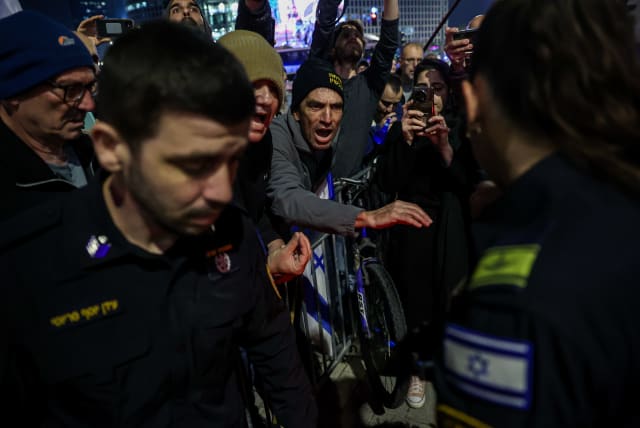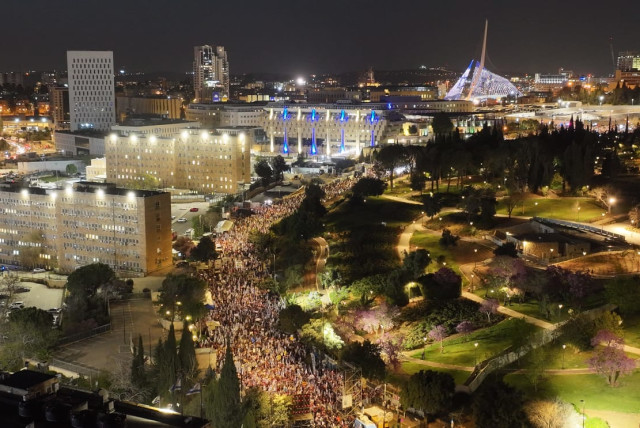Israel Police censoring anti-war signs in protests, demonstrators say

Police are clearly interfering in the political content of the protests, according to activist Yeheli, who explained that the signs that are taken don't contain messages of incitement or slander.
The Israel Police have been confiscating signs and preventing chants with certain anti-war messaging, according to protesters, who recounted similar experiences at numerous protests in multiple cities.
Some messages that commonly led to confiscation or that protesters with megaphones have been told they are not allowed to say include references to Israeli actions in Gaza as “genocide” or “massacre,” according to the protesters.The police are interfering in the political content of the protests, according to activist Yeheli, who explained that the signs that are confiscated do not contain messages of incitement or slander.
Should police be interfering with protests?
Police have also explicitly told Yeheli that some content is not acceptable to them. “No chants about massacre,” an officer told Yeheli outright.
“We were very surprised,” said Yeheli. “At first, we tried to argue,” he added, explaining that the protesters felt the police had no real legal standing or case to take away signs based on their political messaging.Police take the signs regardless of legalities “because they do whatever they want,” he said. “At the end of the day, they are police, and we are citizens.”
“It’s pretty appalling that police feel comfortable involving themselves in our political content,” he added.Yeheli recounted a large protest that occurred in a cordoned-off area. Police checked every sign that the protesters were bring to the event; they allowed most of them but confiscating a few. “They took a sign that said, ‘Food, not Bombs,’ he recalled.
In another case, Yeheli’s friend built a model of an F16 and simulated it dropping bombs bearing words such as “bombing,” “starving,” and “disease.” Police confiscated the model, saying it was offensive, said Yeheli, adding that this is a regular occurrence.
Police go deep into the crowds at protests to take away signs like the one Yeheli described, he continued. “What public feelings are being hurt? There is no public there [in the crowd of protesters]. You came here to flex for the minister [Itamar Ben Gvir],” he said of the police who do that.
protesters express frustration towards police
To some protesters, it feels as if the officers are confiscating items just to show off to their superiors. “It’s clashing with us for the sake of clashing with us, to show that they are doing something,” Yeheli said.
A frustrating impact of the alleged police censorship is that it is working, said Yeheli, adding that he now puts a lot of thought into the signs or displays he makes so that police will not take them away.
“They removed a sign that said, ‘Girls and boys want to live. Enough killing,’” recounted another protester, Hillel. “A woman who was between 40 and 50 years old came to hold the sign because she wanted to lament the unbelievable number of children who have died on both sides of this conflict,” he said, “but the police were violent to her and grabbed her sign.”
Police agreed to give her back the sign, but only the part that read “Girls and boys want to live” and not the part that called to stop the killing, Hillel added.
“It’s unclear. It’s so arbitrary how they use their authority,” he added. “It’s unbelievable; there is no clear standard.”
Hillel confronted officers at a Jerusalem protest, asking them why they were using their authority to “remove signs that don’t suit you,” reminding them that they have this authority only under certain circumstances.“Make a complaint,” an officer told him, not addressing the question. “I have the authority [to confiscate signs], so complain.”
“This is the response of someone who feels they don’t have to answer to anyone,” Hillel told the officers. “But you do,” he added. “The law is not clay in your hands.”
A third protester described similar experiences. “Since we started protesting in the first months of the war, anything that says the words ‘genocide’ or ‘massacre’” is confiscated, said Iddo, an activist with the anti-occupation bloc.Police also explicitly warned them against using this messaging, Iddo said. “We were told in advance that those signs would be taken because they ‘upset the public order,’” he said, adding that police would often take them violently.
“There were cases where people were knocked to the floor [when police took their signs] and then the police would decide to arrest them,” he elaborated.
Iddo isn’t convinced that the police believe the assertion that these signs disrupt public order. “When, like, 20 people have those kinds of signs, they give up on taking them,” he said, adding that sometimes, they appear to decide not to confiscate posters arbitrarily.
In Iddo’s experience, police haven’t reacted to chants with the words “massacre” or “genocide,” which would theoretically also force police to act if this messaging disrupted public order.
“The Israel Police is committed to upholding public safety and order while respecting the rights of individuals to express their opinions within the boundaries of the law,” said a police spokesperson.
“The Israel Police aim to prevent incitement, hate speech, or any form of unlawful conduct. Under the authority vested in the police, they may restrict signage or prohibit specific chants deemed to incite violence, promote hatred, or disrupt public order,” they added.
“It is essential to note that each situation is evaluated individually, taking into account various factors such as public safety, potential for escalation, and adherence to the law.”
Jerusalem Post Store
`; document.getElementById("linkPremium").innerHTML = cont; var divWithLink = document.getElementById("premium-link"); if (divWithLink !== null && divWithLink !== 'undefined') { divWithLink.style.border = "solid 1px #cb0f3e"; divWithLink.style.textAlign = "center"; divWithLink.style.marginBottom = "15px"; divWithLink.style.marginTop = "15px"; divWithLink.style.width = "100%"; divWithLink.style.backgroundColor = "#122952"; divWithLink.style.color = "#ffffff"; divWithLink.style.lineHeight = "1.5"; } } (function (v, i) { });

